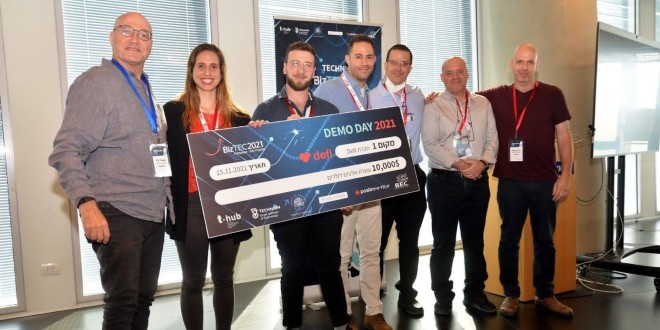Every public place where people congregate should have at least one – PADS (public access defibrillators), AED (automatic external defibrillators) or, for short, defibs. This is a device that gives a high- energy electric shock to the heart of someone who is in cardiac arrest, whose heart suddenly stops beating because of an electrical failure or heart attack.
But because they are relatively expensive and large, many places lack defibs. Now, the Defi student team established at the Technion-Israel Institute of Technology in Haifa, has won first prize and $10,000 in the BizTEC 2021 entrepreneurship competition, which just took place in Tel Aviv. The prize was awarded to the team members for the development of a compact portable defibrillator that is inexpensive and easy to use.
Sudden cardiac arrest is caused when the heart’s electrical system malfunctions. The heart stops beating properly, and its pumping function is “arrested” or stopped. Defibs are ambulatory devices designed to automatically analyze the patient’s heart rhythm and, if it is found to be in need for fibrillation, deliver the electric pulse (or “shock”) to the heart to restore the normal heart rhythm.
These devices are typically housed in a briefcase container, mounted to wall on offices and public places. Hand-carried AED’s are expensive, and their size and shape impede portability. The product on which the Defi team members are working is a cost effective, accessible alternative to the traditional defibrillator that would significantly decrease its size and price and making AEDs more abundant in society.
The members of the team are Ravit Abel, graduate of the Wolfson Faculty of Chemical Engineering; Idan Shenfeld, a graduate of the Taub Faculty of Computer Engineering in the Rothschild-Technion Program for Excellence, and Alon Gilad, a mechanical engineer studying for his master’s degree in the Faculty of Biomedical Engineering. The team was accompanied throughout the accelerator process by Tel Aviv Sourasky Medical Center’s chief information officer Eyal Kellner, and the director of the hospital’s Cardiovascular Research Center, Prof/ Yaron Arbel.
Several months ago, the team took first place in the iTrek competition, which was held at the Technion and at the Jacobs Technion-Cornell Institute at Cornell Tech.
Today, the BizTEC Entrepreneurship Program is part of t-Hub, the Technion Entrepreneurship and Innovation Center, headed by Professor Ezri Tarazi, under the leadership of Ohad Yaniv, who heads the BizTEC accelerator program and startup programs.
The BizTEC program was founded 17 years ago to cultivate novice entrepreneurs seeking to develop deep technologies that demand interdisciplinary collaboration and in-depth knowledge infrastructure. It provides participating teams with close professional guidance by mentors from academia and industry.
Since it was established, its graduates have founded dozens of active companies that have collectively raised more than $1 billion, including Breezometer, Augmedics, Windward, Houseparty and Presenso. This year, 100 teams applied for the program, and of them, 37 were accepted. Eleven teams made it through to the finals and presented their developments to the audience.
The final event was attended by Technion president Prof.Uri Sivan, numerous entrepreneurs, and senior representatives of the venture capital industry in Israel, many of them Technion alumni. They included former minister of science and technology and entrepreneur Izhar Shay, Ormat founders Dita and Yehuda Bronicki, etrepreneur Yossi Vardi, Dadi Perlmutter, who served as executive vice president of the global Intel Corporation, Playbuzz founder Shaul Olmert, former CEO of Microsoft Israel, Yoram Yaacovi and entrepreneur Dan Vilenski.
Sivan opened the event and said: “In the past few years we recognized that entrepreneurship is a far broader field than tech entrepreneurship or business entrepreneurship. Entrepreneurship is a state of mind that can be applied in every sphere of the lives of us all and is tightly connected with leadership. In recent years here at the Technion, we developed numerous social entrepreneurship programs, meaning groups of people that go out to the community and use entrepreneurial tools and entrepreneurial thinking to better the community’s condition, working together with the community.”
“As the Technion’s leading entrepreneurship program, BizTEC well reflects the integration of entrepreneurial leadership as a substantial part of the study experience,” said Prof. Ezri Tarazi, head of the Technion Entrepreneurship and Innovation Center (t-Hub). “It furnishes participants with tools for the assimilation of deep technology in meaningful applications that are connected to the global challenges we face in human health, sustainability and the digital world. This event, hosted by t-Hub and attended by senior members of the Israeli hi-tech industry, is proof of the Technion’s continuing centrality to Israel’s economy.”
“BizTEC is a small, special place that enables teams to come in with just an idea, and in less than six months, acquire all the tools they need to turn it into reality,” said Yaniv. “Starting with building the business model, through validation, creating proof of concept, building a presentation, all the way to the pilot phase, first customer acquisition and even the first investment. Compared to any other accelerator in Israel, and even on an international level, its results are exceptional.”
Two teams took second place: BrainSense, which developed a system that monitors stroke events by identifying changes in brain activity and whose members are Technion students; and Oral Detect, which developed a home system for the early detection of tooth decay and won the BME-Hack Biomedical Engineering Hackathon that took place at the Technion earlier this year. Third place was taken by Soltrex, a team of Technion graduates that developed a fully autonomous technology for the cleaning and operation of solar panels.



